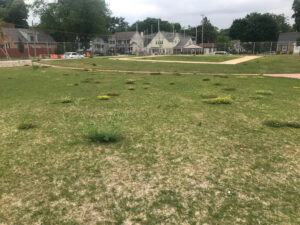
Image of weeds infesting a schoolyard that MGG hopes to support.
K-12 students spend an average of 35 to 37.5 hours per week in schools. Pest and pesticide hazards can have detrimental short- and long-term effects on their health and safety. Only an estimated 15-20% of these US school districts have programs that effectively control pest and weed problems with limited pesticides.
Regrettably, Midwest Grows Green (MGG) has engaged few schools in sustainable landscaping since its 2015 start. This will change in 2022 thanks to funding from the Athletic Brewing Company, Oberweiler Foundation and our generous donors.
Throughout this summer, MGG’s Technical Assistance Program (TAP) team has hosted sustainable landscape management meetings with schools in low-income and minority neighborhoods. These schools include Chicago Public Schools’ (CPS) William H. Ray Elementary School and Gwendolyn Brooks College Preparatory Academy and Milwaukee Public Schools’ A.E. Burdick Elementary School, Bay View Montessori and La Escuela Fratney.
“All of our targeted schoolyards face similar problems of poor turfgrass quality, bare spots and compacted soil,” MGG’s leader, Ryan Anderson, explained. “Unfortunately, none of the schools have the capital to implement the aeration, organic fertilization, compost topdressing, mowing and overseeding practices TAP normally recommends.”
MGG suggested low-input, eco-lawn varieties to cost-effectively restore the schoolyards. White Dutch clover serves as the building block of these mixes by hosting rhizobia bacteria in their roots that cycle and fix nitrogen into plant accessible nutrients. This natural-fixed nitrogen feeds turfgrass and limits or eliminates the need for future fertilization. Most eco-lawn mixes, also, only require one mow per month. Learn more about eco-lawns from distributors of Pro Time Lawn Seed and Good Nature Organic Lawn Care.
“Establishing an eco-lawn on our grounds provides additional greenspace for our students and the community to enjoy,” Chandra Garcia-Kitch, Ray Elementary School’s assistant principal, stated. “In addition, the healthier soil will decrease pooling water on all of our outdoor blacktop and greenspace recreation areas.”
MGG currently has funds for its soil scientist, Vytas Pabedinskas, to develop a landscape management plan for Ray and Burdick elementary schools. Further support is needed, however, to help more schools.
“We strongly believe that the plans developed by TAP and Pabedinskas will ensure healthy, playable and resilient landscapes for MPS’ more than 150 schools,” said Heather Dietzel the Sustainability Project Manager for MPS.
To support MGG’s pesticide elimination and schoolyard restoration work, please consider making a tax-deductible donation at bit.ly/MGGdonation. MGG staff begin schoolyard site visits this August. First, Anderson and Pabedinskas will present at the Milwaukee Green & Healthy Schools Conference on August 5th. Second, Anderson and IPM Institute’s founder, Dr. Thomas Green, will return to Milwaukee for a MPS buildings and grounds staff Pest Defense training on August 24th. Thank you!
